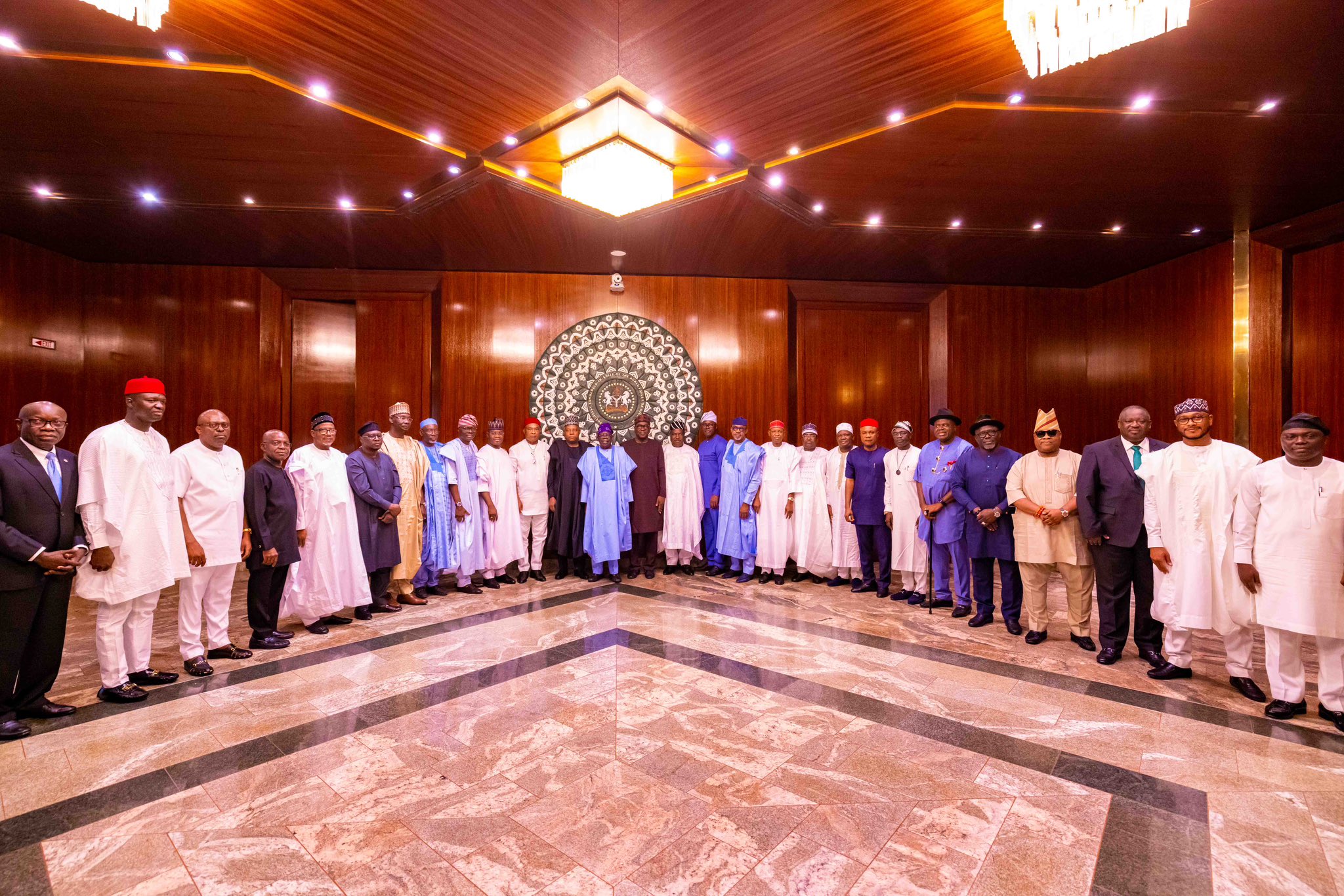For the umpteenth time last week, July 28, 2025, President Bola Ahmed Tinubu called out Governors of Nigeria’s 36 states on the need to look after the welfare of those who elected them into office.

His call this time around was not centred on politics neither was he playing to the gallery.
That he made the call during the National Economic Council, NEC meeting where all elected Governors are members is significant.
It was because that will be the third time he will draw attention of the state chief executives to responses he is getting from the grassroots about state of the nation via a vis the economy and living condition of the masses.
He pointedly told the Governors that they should implement policies to cushion the effect of the various economic policies that has reduced the standard of living of Nigerians.
He said: “The economy is working. We are on the path of recovery, but we need to stimulate growth in the rural areas. We know the situation in the rural areas, let us collaborate and do what will benefit the people”.
With the above declaration, Tinubu was stating the obvious.
It is on record that since the Second Republic days, late elder statesman, Chief Obafemi Awolowo’s Unity Party of Nigeria’s , UPN, manifesto was centred around . . . free education at all levels, Free health services, Integrated Rural Development and Full Employment.
Isn’t it sad that almost fifty years after this programmes were enunciated nobody has faulted them neither have they been out of tune with reality?
Today, the reality is that most of our Governors focus more on urban centres even when it is as clear as crystal ball that majority of our 220 million people dwell in rural areas.
That President Tinubu specifically mentioned rural areas among areas not touched by the governors is sad.
Sad because, there are agencies established by the Federal Government that has served as mere duplication of roles and duties of local and state governments in the country.
You ask yourself why should somebody in Abuja build health centres and fund rural electrification in states closer far flung from the nation’s capital while those elected to cater for the people look elsewhere.
How do you ensure effectiveness of such programmes in terms of monitoring implementation in a diverse country like ours?
Misplaced priorities by the states have led to neglect of rural areas and the accompanying grinding poverty.

It has led to unnecessary intervention by the government when such are better done by local councils which is an arm of government created to bring government closer to the people.
Today, what you see in the rural areas are sheds in the name of schools and dilapidated structures built by states in the name of clinics and health centres but left to rot as a result of lack of personnel and equipment to man them.
The resultant effect is Teaching hospitals that are supposed to be referral centres turning into primary health centres.
There is no gain saying that the level of poverty in the country considering the resources statutorily allocated for them is out of this world.
As a father of the nation, Tinubu has demonstrated that he feels the pains of the citizens.
Hence, by calling out the Governors, he has act of responsiveness borne out of lack of proper utilisation of resources allocated to cater for the people. He has also demonstrated that he knew people are facing economic hardship in spite of resources so allocated.
His clarion call on governors is also an indication that his pleas made inside the corridors of power have not been heeded and has decided to report them to Nigerians and by extension the electorate who elected them including him to power.
But shouldn’t he have continued to discuss such issues in camera with the Governors instead of washing the dirty linen of the NEC in public?
No. Reason that on at least two previous occasions he has drawn the attention of at least two power blocks in the country to the governors about his feelings.
He has openly called the attention of both the Northern leaders led by Arewa Consultative Forum, ACF and Afenifere leaders from South West to the increase in funding being received by the states and local governments since his administration came to power.
By the report it means that his expectations from the later in terms of performance have been cut short.
By his public warnings he has reported the governors to those who elected into office and sort of excruciating his arm of government.
After all, presence of federal agencies is being felt in provision of infrastructures like roads, education, health and other facilities is ongoing in all the six geo-political zones.
Right in the bowel of Aso Rock he told both groups separately that they should put their Governors to task over the state of the economy in their domain and how the people close to them are faring.
As for Tinubu, the Federal government has disbursed more funds to the state governors than they hitherto had received.
He even contended that hard as the policies are, the Governors now had enough cash to reduce the burden, implement policies that will turn around the fortunes of their states by putting more money they have received from the Federation account into positive use to turn around macro- economy of their states.
If the Governors are pretending, figures released by the Federal Allocation Account Committee, FAAC, with membership made up of Accountant Generals of states and their Finance Commissioners and chaired by the Finance Minister of Finance.
Their job is to collate what the nation earns monthly and distribute to the states based on percentage of sharing the Revenues as stipulated by Revenue Allocation and Mobilisation Committee using population as one of the yardsticks.
For effect, the monthly allocations are published for all to see.
To justify and present the improved economic health of the states which no governor has repudiated, let us see statistics published by the Nigeria Bureau of Statistics.
In May 2023, the last month before the removal of fuel subsidy, the FAAC Allocation was N976.34700 billion shared among the three tiers of government in the country.
It was made up of:
- Statutory allocation=N480, 75bn
- Solid Minerals=N16. 683billion
- Equalization Fund =N70bn
- Non oil Export=N34bn
- Electronic Money Transfer=N61. 61bn and
- VAT=217. 74bn.
It was shared proportionately among the three tiers of govt as follows:
- FG = N274. 84bn
- States=N290. 71bn
- LG=213. 675bn no
- 13% Derivation for Oil Producing states=N45. 65bn.
The above figures are not inclusive of Internally-generated revenue, IGR of each of the 36 states which they are at liberty to appropriate to themselves the way they like.
Today, two years down the line, the FAAC Allocation to all the three tiers have more than doubled as a result of increased revenue from the federation.
In May 2025, two years into the new administration, the FAAC declared a total sum of N1. 659 trillion during the meeting held in June.
The figure is a reflection of what has been since the oil subsidy removal and the increased revenue from the crude oil exports which had increased from barely 1 million barrels per day to 1.8 milion, as at last month.
The increase in oil receipts is also as a result of reduction in oil theft and improved production by the oil companies operating in the Niger Delta areas contrary to what obtained in the previous administration as a result of restiveness in the region.
The breakdown is as follows:
- Statutory allocation= N863. 895 bn
- VAT= N691. 714 bn
- Electronic Money Transfer= N27. 667bn
- Exchange Difference =N76. 614bn.
Out of this amount,
- The FG took=N538. 004bn
- States=N577. 841bn
- LG= N419. 968bn
- Oil Producing states (13% Derivation)=N124. 076bn.
From the above figure which is almost triple of what obtained two years ago and are being received on monthly basis for the past two years, the states’ finances have improved significantly.
This figure is also not inclusive of the state’s IGR which has also improved even in states that has low IGR.
Another indication of improved finances is the fact that none of the states have indicated interest to take fresh loans-local or foreign, to meet their obligations in an era when local governments are struggling to extricate themselves from strangle hold of the states on their monthly allocation which the obnoxious States/LG Joint Account permitted.
With the published allocations, it is obvious that the three tiers of government has more funds to play with.
The question now is how judiciously have the money been used for projects that have direct impact on the lives of ordinary people.
The question is with the provisions in our constitution, who calls the Governors to order especially as regards embarking on exotic projects e. g construction of unviable airports when thousands of kilometres of urban, semi urban and rural roads that could connect the various areas of the states are left undone.
Tinubu’s last call out on Governors is also a call to civil society groups and other pressure groups to monitor state and local governments and put them to task on their performances.
Lack of consequence for anti – people governance and responsiveness to plight of masses has encouraged impunity on all fronts.
By asking the Governors to release largesse to the people and feel its impact, Tinubu is directly asking the electorate to shift focus away from the federal government to states on areas of their responsibilities.
It is also obvious that Tinubu, though feels for the ordinary people may be asking them to support him and or assess his office independent of Governors as we approach 2027.
Hence, on the face of it, his call is political.
The last is definitely yet to be heard on his relationship with the state governors as we approach the next election which is nearer by political calculations.
For now, the Governors still have time to improve on their service delivery to the masses who elected them into office.
It is obvious that from January next year, governance may take the back stage as the 36 state governors minus those with off season election will be preoccupied with re-election or how to put their surrogate in office as regards those who are serving second term.
For those who wish to retire to the senate as has always been the case, securing the electorate ticket also means they’ll still need the electorate who voted them as governors though with restricted constituency.
My admonition is that the legislators who also collected money for Constituency projects should deliver to make life more abundant for the people.

